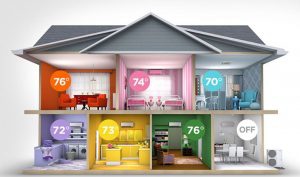LOWER YOUR UTILITY BILL AND DECREASE YOUR CARBON FOOTPRINT WITH THIS INCREASINGLY POPULAR HVAC SYSTEM
Heating and cooling account for nearly half the energy use in a typical home – making it the largest energy expense. And with the summer months upon us along with the promise of higher electric bills, an energy-efficient air conditioning system that has been popular overseas for decades is now becoming a top choice for homeowners in the US: the ductless mini-split.
Ductless mini split HVAC systems improve comfort and energy efficiency through temperature zoning, a climate control approach that allows you to only heat or cool the space you are using – instead of wasting money and energy on the entire house at once.
A separate thermostat or remote controller for each zone allows you to set different temperatures in different areas– making it possible to meet everyone’s comfort needs. For this reason, ductless systems are a great way to address those uncomfortable hot and cold spots that occur in every building.
The energy savings are significant. The government’s ENERGY STAR program reports that the mini-splits it certifies use 60 percent less energy than standard electric heating systems, and 30 percent less than conventional air conditioners.
HOW DUCTLESS SYSTEMS SAVE ENERGY AND MONEY
1. Higher SEER ratings. The Seasonal Energy Efficiency Ratio (SEER) measures how efficiently a central air or mini split system will operate over an entire season. The higher the SEER, the more efficient the system is.
As of 2015, federal requirements mandate that central air and mini splits must have a minimum of 14 SEER to be used in the U.S. Traditional central air systems typically cap out at 17 SEER, and average in the 13-16 range.
Ductless systems are able to deliver significantly higher SEER ratings. For example, the newest systems from Mitsubishi deliver an incredible 33 SEER rating – greatly reducing utility bills and making them a green choice for your heating and cooling needs.
2. Less energy leakage. Central air systems rely on extensive ductwork to deliver heated or cooled air. In a typical house, according to Energy Star, about 20 to 30 percent of the air that moves through a duct system is lost through leaks, holes, and loose connections.
Mini splits utilize a thin conduit that pumps directly into the indoor air handler from an outdoor condenser, limiting this type of energy loss to less than 5 percent.
3. Adjustable airflow. Ductless systems have adjustable louvers that allow you to direct airflow up and down, and around the room, so conditioned air moves directly to where it’s needed most. It also maximizes comfort and increases efficiency by allowing homeowners to quickly cool or heat the air in the lower, lived-in part of the room.
Central air systems enable you to open and close vents, but they do not allow you to direct airflow within a room. In fact, closing vents can lead to pressure imbalances within the system that create additional inefficiency.
4. Temperature zoning. While central air takes a blanket approach to temperature control (i.e. “on” or “off”), one of the biggest advantages of a ductless system is the ability to provide personalized heating and cooling that’s adjustable through the air handlers, remote controls, and now even your smartphone. This allows you to set temperatures in each area and maximize individual comfort. It also helps you reduce your energy bill by not cooling or heating unoccupied areas.
5. Inverter technology – cruise control for your HVAC system. Ductless units improve energy efficiencies with inverter-driven compressors that speed up or slow down based on the needs of the system, instead of wasting the energy needed to start the unit each time a room must be heated or cooled.
Central air systems turn on and off with the associated full power load throughout the day to maintain the desired temperature. The mini split’s inverter compressor only uses enough energy to raise or reduce a room’s climate to the desired setting, and then idles there until more power is needed. Turning these systems on and off will actually result in higher energy bills by increasing wasted energy.
TAKE CONTROL
Making a smart decision about your HVAC system can have a big impact on your utility bills – and your family’s comfort. With efficiencies like temperature zoning and inverter technology, ductless mini splits allow homeowners to gain better control of their energy use while enjoying better comfort. To learn more about how a ductless system can enhance the comfort of your home, contact the experts at Morris Plumbing, Heating & Air Conditioning at (978) 961-0338 or click here for a free estimate.

